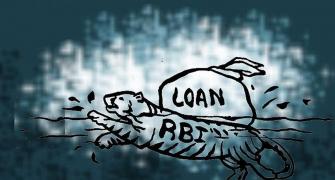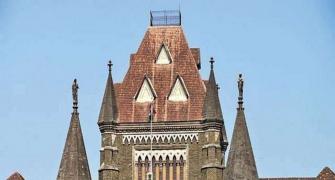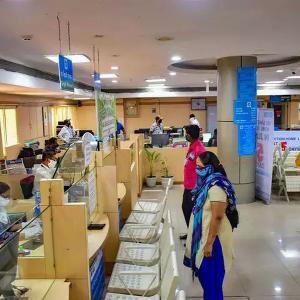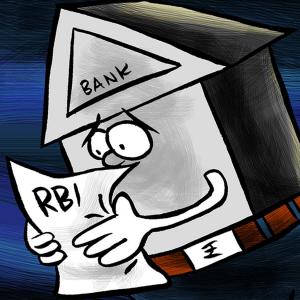Of the 2,562 customer complaints received between January 2020 and March 2021, a majority relate to illegal apps.
At least two dozen suicide cases have been reported, perpetrated by the harassment by loan app operators, points out Tamal Bandyopadhyay.
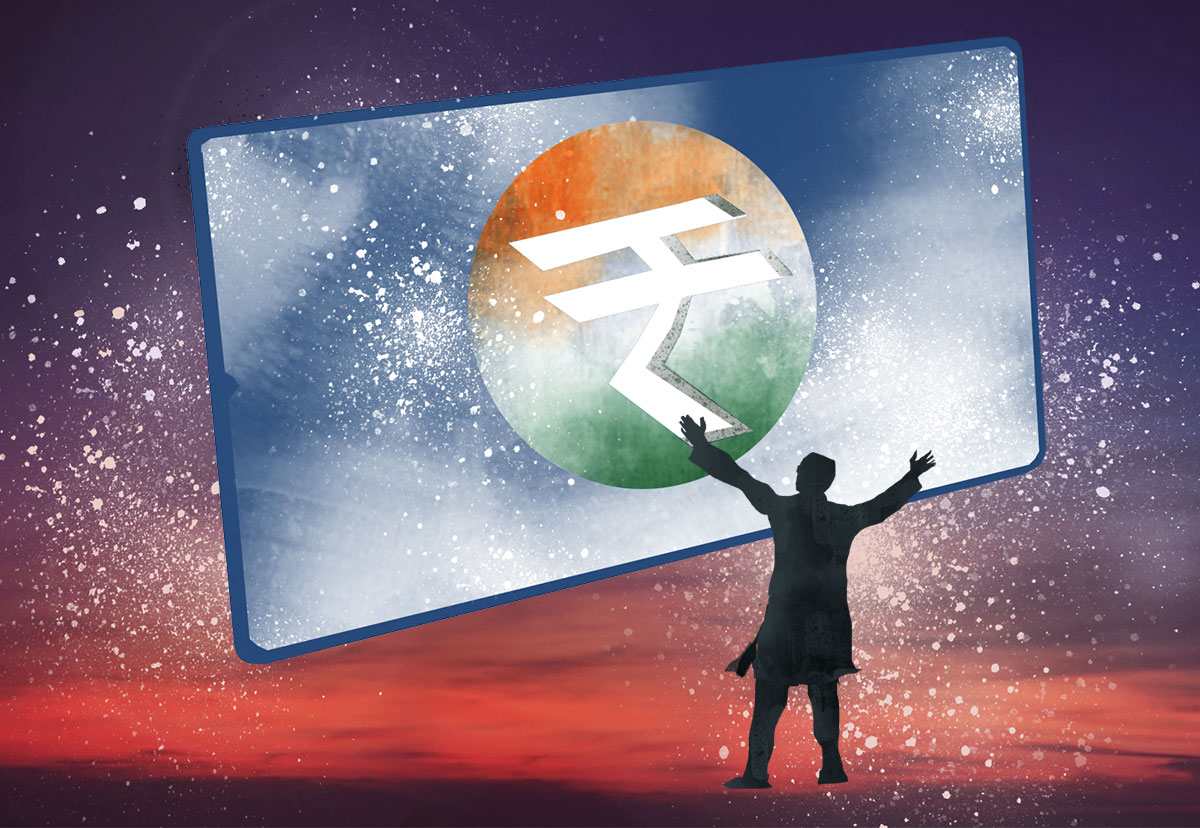
Finally, the Reserve Bank of India has legitimised digital lending. It has coined a new term to describe the players in this space -- lending service provider (LSP). They will not lend from their own balance sheets but play the role of outsourcing agents for banks and non-banking financial companies (NBFCs).
To be sure, the concept is not new in Indian financial architecture. In November 2006, the RBI had introduced the outsourcing arrangement for financial services providers. The direct sales agents (DSAs) of banks belong to this category.
The scale and speed at which digital lending has been spreading in India without checks and balances have forced the banking regulator to come up with guidelines on digital lending. This is based on the November 2021 report of a working group on digital lending.
Let's get a sense of the digital lending world first. A 2020 Bank for International Settlements paper has estimated total global digital lending, through fintechs and big techs, at $795 billion in 2019. Since then, it has grown by leaps and bounds.
Fintech, or financial technology, is the term used to describe any technology that delivers financial services through software, such as online banking and mobile payment apps; big tech refers to major technology companies such as Apple, Google, Amazon, Facebook and Microsoft.
The largest market for both fintech and big tech is China; the USA is the second largest market for fintech but its share in big tech is relatively small.
Based on data from a sample of banks and NBFCs (representing 75 per cent and 10 per cent of total assets of banks and NBFCs, respectively, for FY2020), the RBI report has pegged the amount of money lent through digital mode by banks at Rs 1.12 trillion in contrast to Rs 53.08 trillion via physical mode.
For NBFCs, it's Rs 23,000 crores (Rs 230 billion) vis-à-vis Rs 1.93 trillion. Between 2017 and 2020, the loans given through the digital mode rose more than 12-fold -- from Rs 11,671 crore (Rs 116.71 billion) to close to Rs 1.42 trillion for the sample. Since the onset of the Covid pandemic, the pie has grown many times more.
How many LSPs are there? It's difficult to say but the figure could run into thousands. At the beginning of February 2021, there were about 1,100 lending apps, 600 of which were illegal.
Till now, the LSPs had a field day. In the prevalent ecosystem, the customers don't know from whom they are borrowing. Instead of an agent, the LSPs are posing as providers of loans. They are deciding on the loan rates and have unlimited access to data, which are often misused in the opaque world of the digital lenders.
The RBI norms have brought the lenders -- the banks and NBFCs, which are regulated entities -- to the forefront. There will be a direct interface between the borrowers and the lenders; the LSPs will just provide the platform. Also, their access to data will be limited -- need-based.
While recognising the fact that digital lending will play a key role in the credit delivery space, the primary focus of the norms is customer protection.
In the new world, the banks and NBFCs will have to provide a 'key fact statement' to the borrowers, giving the last detail -- interest rate and total interest charge during the entire tenure of the loan, any other upfront charge, processing fees, insurance charges, the loan amount disbursed and amount to be repaid by the borrower, tenure of the loan, frequency of repayments, number of instalments, and amount of each instalment.
Any fees and charges, which are not mentioned in the statement, cannot be charged at any stage of the loan repayment.
The loan agreements will be signed by the banks/NBFCs and the borrowers; the LSPs will be just a carrier to facilitate the transaction. The banks/NBFCs will directly disburse the loans to the customers' bank accounts.
This means, there will be a parallel agreement between the banks/NBFCs and the LSPs for the fees to be charged by the LSPs for identifying the customers, assessing their creditworthiness, collection of loans and other peripheral activities.
Can the banks/NBFCs charge the customers, say 28-30 per cent or even more loan rates (as has been the case now for many borrowers in the digital lending space), keep 12 per cent for themselves (as interest income), and pass on the rest to the LSPs as fees?
It may not be easy as the auditors, the boards, and the banking regulator will keep a hawk eye on such transactions.
This means, the loan rate may go down in the new regime, which kicks off from December. The norms are applicable for new customers as well as the existing customers looking for fresh loans. The banks and NBFCs need to put in place systems and processes for new norms by November 30.
The practice of the so-called first loss default guarantee (FLDG) is also being banned. The FLDG ensures that in case of default, a certain percentage of loss (say 5-10 per cent) is borne by the digital lenders.
For instance, if Rs 20 lakh (Rs 2 million) out of a Rs 1 crore (Rs 10 million) loan outstanding cannot be recovered, the digital lenders share Rs 5 lakh-Rs 10 lakh (Rs 500,000 to Rs 1 million) loss.
What's the logic behind banning the FLDG? A non-lender cannot take any credit risk.
Till now, a few NBFCs were renting out their licence to digital lenders, which were arranging the money to be lent as well as taking the credit risk by agreeing to high FLDG.
Will the LSPs be allowed to tie up with any number of banks and NBFCs as their outsourcing agents? The guidelines are silent on this.
Still, the business model of the digital lenders has to change as they have lost their freedom to directly deal with the customers. The lenders are being held accountable for all loans and fintechs are nothing but a platform for the transactions.
Yet, in another fallout of the new norms, the peer-to-peer (P2P) industry -- an online marketplace or a lending platform for collateral-free small loans -- may have to take a close look at their business model.
The entities in this space collect money from individuals and lend to individuals as well as micro and small enterprises. Unlike LSPs, they need capital (Rs 2 crore/Rs 20 million) and are directly regulated by the RBI.
Also, the exposure of a lender to such platforms is capped at Rs 50 lakh (Rs 5 million). Some of them may not see any incentive to remain in business as the playing field has changed.
PS: The new norms don't address the menace of illegal apps. Of the 2,562 customer complaints received between January 2020 and March 2021, a majority relate to illegal apps with which the RBI has nothing to do.
At least two dozen suicide cases have been reported in the media, perpetrated by the harassment by such loan app operators.
The finance ministry expressed its concerns about such illegal loan apps. The RBI will prepare a whitelist or an online registry of the legal loan apps and the ministry of electronics and information technology will ensure that only the whitelist apps are hosted on app stores.
In addition to that, there needs to be coordinated efforts among the regulator, the state governments (money lending is a state subject), various investigative agencies, and the ministry of corporate affairs to deal with the illegal apps.
Also, a massive digital literacy drive, particularly in the hinterland, is a must if we want to stop exploitation of the hapless small borrowers.
Tamal Bandyopadhyay, a consulting editor with Business Standard, is an author and senior adviser to Jana Small Finance Bank Ltd.



